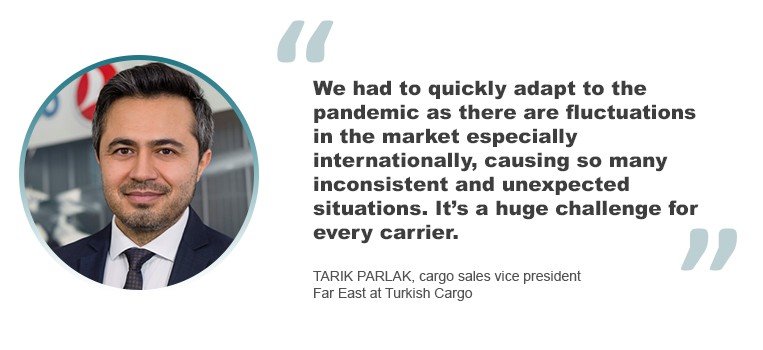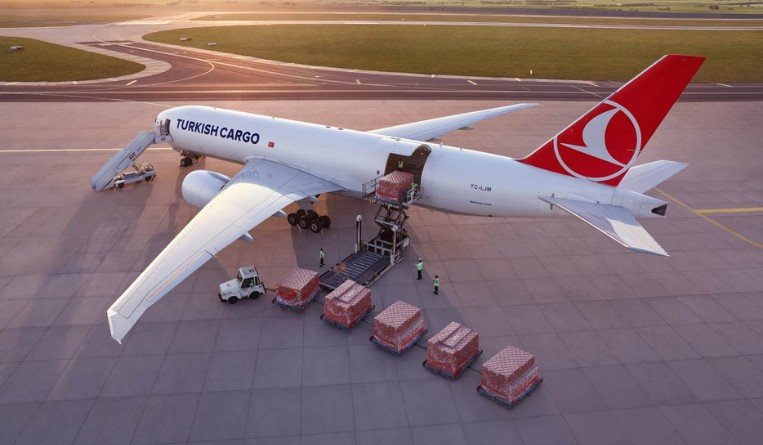Turkish Cargo is anticipating further growth next year after reaching its target to become one of the top air cargo brands in the world.
Tarik Parlak, cargo sales vice president for Far East at Turkish Cargo told Asia Cargo News that the carrier was also able to expand its market share and grow its network while pushing digitalization to position for further growth.
“We set the target of becoming one of the top 3 cargo carriers in the world. Our market share increased from 3.7% in 2019 to 4.7% in 2020 [and] we are preparing for further growth in air freight volumes after gaining market share last year,” Parlak, who also held the cargo director role in Africa for Turkish and cargo vice president for Western and Southern Europe Region, said.
Top 3 goal reached
“With its successful performance in June, Turkish Cargo managed to reach its goal of becoming one of the top three air cargo brands in the world,” the Turkish Cargo executive added, citing data released by the International Air Transport Association (IATA).
“Our flag carrier air cargo brand, after passing biggest brands from Americas, Europe and Far East, managed to rise to third place in June 2021, from being sixth place in the same period of previous year,” he continued, noting that the carrier also achieved the “biggest growth ratio” among the top 25 air cargo carriers with 5.7% market share in June 2021.
Throughout the Covid-19 pandemic, Parlak said Turkish Cargo – like many other airlines – had to remain agile to support market requirements.
“We had to quickly adapt to the pandemic as there are fluctuations in the market especially internationally, causing so many inconsistent and unexpected situations. It’s a huge challenge for every carrier,” he added, noting that Turkish Cargo “didn’t lean back,” even during the pandemic.
“We decided to convert passenger aircraft into freighters in order to tailor to the market demand since February of last year, the early stage of Covid-19,” Parlak told Asia Cargo News. Over the course of the pandemic, he said Turkish Cargo delivered 100 million Covid-19 vaccine doses to more than 35 countries around the world.
Asia Pacific operations
For Asia-Pacific, he said within the first three months of this year, Turkish Cargo “kept [its] overall capacity for the whole APAC region” and even “raised it for more than 30%, if compared with 2020 by adding the pax-cargo flight,” Parlak added.
The Turkish Cargo executive also signalled plans to boost its Asia operation citing “opportunities” in the region. He said currently, the cargo arm of Turkish Airlines has 21 online stations in the region, providing air cargo connections through its Istanbul hub.
“Although the overall market environment was unstable last year, our region recorded a remarkable revenue of US$1 billion in 2020,” the Hong Kong-based Parlak said. “I believe there are a lot of business opportunities in the Asia Pacific as it is the biggest export region in the world with China, Vietnam, Japan and Korea,” he added, further citing expansions for its several Asia stations, like the aircraft upgrade to Boeing 777s for flights to Bangkok and Kuala Lumpur, and adding extra capacity through passenger-cargo flights to Vietnam, Japan and South Korea.
“We are striving to increase our market presence in the region and always respond to the market’s air freight needs,” Parlak further said, adding that the carrier will also continue to build its fleet and network.
“The network and fleet of Turkish Cargo is expanding and will continue to grow also in the upcoming period as we will continue to increase our overall service and network coverage,” he added.
As part of its expansion efforts, the official said Turkish Cargo is also expanding its cargo terminal in Istanbul – the SmartIST – which is the biggest project that the carrier is processing now.
Parlak said Turkish targets to move all operations over to this new facility by spring.
“It is built to reach 4 million tonnes of annual capacity when all phases are completed,” he added, noting that inside the SmartIST, Turkish Cargo also aim to use modern technology such as automated storage systems, 3D ULD planning and unmanned ground vehicles and integrate them fully into warehouse management systems and work process.
Parlak said the carrier also created the online booking system TKGO, where users are able to perform online bookings, tracking transactions, and claim cases.
In APAC, he said “over 70% of the cargo reservation is directly done by this platform.”
Meanwhile, Turkish Cargo expects the industry to start seeing recovery by the end of the year noting how the pandemic revealed the importance of airline transportation.
“We think that even if the aviation industry has been negatively affected by the epidemic experienced all over the world, it will gradually start to recover towards the end of 2021,” Parlak told Asia Cargo News. “Furthermore, considering the strategic position of our country, we expect that this growth will be more effective for Turkish Cargo. We hope 2022 will see figures rising up for the



